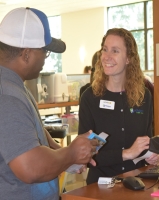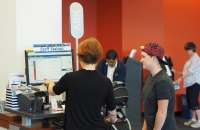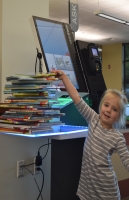Service Evolution: Our Deskless Service Model
Hillsboro Public Library, Ore.
Innovation Synopsis
In 2017, Hillsboro Public Library moved to a deskless service model at our 77,000-square-foot Brookwood location. Using design thinking techniques, staff shaped our “service evolution” by meeting patrons where they are at, empowering self-service patrons and using newfound staff time to engage in longer, more meaningful interactions.
Challenge/Opportunity
Brookwood serves an average 2,500 users a day; formerly, most of our direct patron interactions took place in our welcome area, showcasing our heavy use but making for frantic service. Inspired by Anythink (Colo.), we sprinkled staff “pedestals” and public access computers throughout so orbiting staff and patrons are never far from resources. By getting staff out from behind the desk and focusing on our self-service tools, staff help users at their point of need.
Key Elements of Innovation
Our service evolution began by moving to a model where all floor staff stays with a patron throughout their interaction. To do this, we used design thinking techniques to explore alternatives to our large service desk including refining the “orbiting” staffing model, untangling the competing uses of the welcome area where the desk was located, highlighting self-service options, implementing a staff-designed dress code and, finally, moving away from desks on the first floor entirely.
Achieved Outcomes
With our deskless service model, an average of 84 percent of returns and 86 percent of checkouts are handled by patrons, thus freeing up significant staff time for patron interactions as well as ensuring materials are on the floor and available to patrons faster. We improved the holds turnaround time by 94 percent. Our study and conference rooms function at a 60 percent capacity rate, and visits continue to climb, with 283,199 YTD, a 1.4 percent increase over last year.



